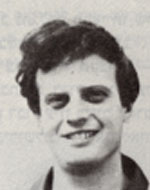Barry (Becky), son of Tanya and Abraham, was born on August 25, 1944, in Kibbutz Afikim, where he grew up in elementary school, and then continued to study at the Beit Yerah agricultural high school in the Valley He was appointed to the center of the Negev and Yehuda District, and was drafted into the IDF in mid-August 1963, completing his first year of service and volunteering for the Paratroopers Brigade. After completing his basic training, he took part in a platoon commander’s course, in a course for infantry officers, in which he had an outstanding cadet, and a basic course for intelligence officers. Officers should be based more on man, on self-discipline and on self-ability, without always relying on the framework and on the formality established by the army. “Upon his release from the IDF, he returned to the agriculture and to the palm branch, which was connected to him. After working hours, he devoted himself to training the members of the kibbutz and played in the Hapoel basketball team Afikim. After a year he went to study at the Hebrew University of Jerusalem, in economics and philosophy, and worked for a living as a youth counselor at the Boyar school boarding school. He completed his undergraduate studies with honors, and continued his studies in the Department of Economics, where he also had a teaching assistant. In addition, he participated in poetry criticism courses. But academic practice only filled part of his time. He devoted most of his work to the budget department of the Ministry of Finance, responsible for the budgets of the Ministry of Education and Culture. One of his colleagues said of his style in his work: “Every problem was analyzed logically, in a Yaffa, clear and clear style that sweeps you to read and read on.” “Be’eri can not be described in words, one dimension does not surround him, just as one can not describe a fire or a busy waterfall,” said the battalion commander, in which he served in the reserves. Another member of the unit said, “How can you express his image, only in silence, if you translate his character into a book, open it in 10 blank, blank pages, and end it with ten blank pages? During the Six-Day War he was an intelligence officer of the battalions and fought during the breakthrough to the Old City, and was even wounded. After the war he was appointed operations officer in his battalion, and served in the War of Attrition and the Yom Kippur War. During the War of Attrition he was promoted to captain without regard to accepted procedures. In his opinion, his commanders wrote: “Barry is an excellent officer, even an excellent officer, who does his job efficiently and devotedly, very diligent, responsible and disciplined. On the 17th of Tishrei 5734 (17.10.1973) in the afternoon, he moved with his battalion to occupy the train station in Sarafum, west of the Suez Canal. Barry was in a force cut off from the main force, and in battle with the Egyptians who surrounded him, he was hit in the chest and killed on the spot. He was laid to rest in the cemetery in Afikim. He left behind a wife and son, mother and brother. In a letter of condolence to the bereaved family, his commander wrote: “In the battle, Barry’s resourcefulness, courage and leadership were revealed. Published by “Hakibbutz Hameuchad” published a book called “Crying Me Reaping” – according to a line from one of his poems. The book contains five poems that he wrote, letters, friends’ comments on his character, his lecture “Valuation of Values in the Work of the Economist,” and a review of the poem “A Man Really Does not Need” by Amir Gilboa; The Hebrew University of Jerusalem has published a book in memory of its fallen graduates, including Barry.
